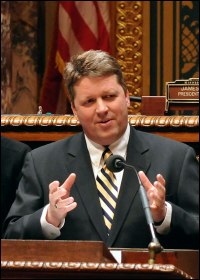Summer Gatherings
The past few weeks allowed me a chance to visit with several groups about a range of issues. The University of Minnesota College of Education and and Human Development held a forum in Northfield a few weeks ago with several educational leaders from the area in attendance. The discussion focused on quality teaching and how higher education must work diligently and directly with school districts to make sure high quality educators are the norm and not the exception. The college has a long range plan to improve teacher effectiveness by connecting ongoing research to teacher programs. The programs will focus on improving teacher support, strengthening curriculum, diversifying the teacher workforce, adaptive teaching, enhanced student teaching experiences, while measuring student progress. It seems like the right approach to “education reform” in an area that has received a lot of attention recently.
Last week I attended the Northfield Rotary Club meeting luncheon. Representative Bly talked about the recent legislative session and provided our thoughts on some of the budget issues that the state will face in the next biennium. It was a great meeting with a super bunch of local individuals who have our community’s best interests at heart.
This Saturday I will be attending a meeting in Waterville with the Waterville Lakes Association. They have some concerns about the DNR’s plans to possibly designate Lake Tetonka as a Muskie lake. The State DNR is considering several sites and are gathering feedback from local citizens about future plans. The Sportsmen’s Clubs, Darkhouse and Angling groups are also weighing in on the issue. The DNR will not make any final decisions until later this year, but are wanting to get the dialogue going this summer.

 On Thursday, the Minnesota Senate set targets to resolve the budget deficit. Last week we received the final budget forecast which gives us the most accurate picture of the kind of revenue Minnesota can expect over the next several years. It may not come as a surprise to know that the news is not pretty. We are in one of the worst economic downturns in recent memory.
On Thursday, the Minnesota Senate set targets to resolve the budget deficit. Last week we received the final budget forecast which gives us the most accurate picture of the kind of revenue Minnesota can expect over the next several years. It may not come as a surprise to know that the news is not pretty. We are in one of the worst economic downturns in recent memory.
